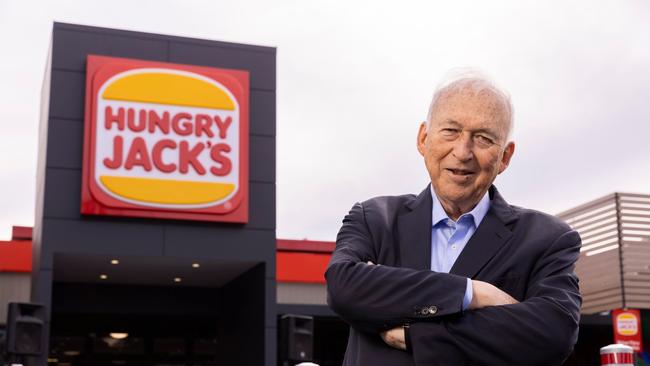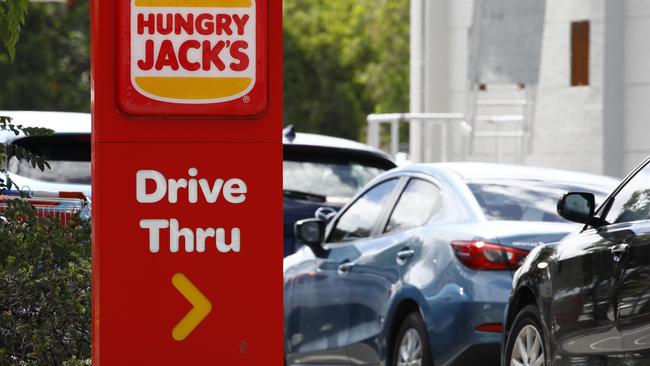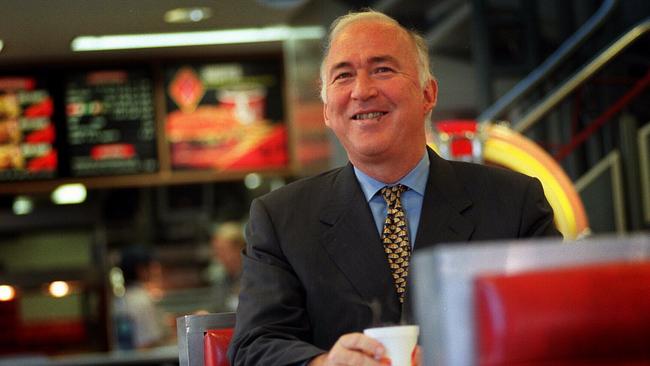‘Business has never been better’: Hungry Jack’s owner Jack Cowin
As his fast food empire readies to hit $2bn, the Hungry Jack’s billionaire talks about his other investments and how he’s now a supporter of nuclear options to secure our energy future.

It has been another whopper of a year for billionaire Jack Cowin and his Hungry Jack’s fast food chain.
The economy may be slowing as interest rate rises bite and inflation pushes up costs, but if anything Cowin believes those conditions have been beneficial for his business.
“Business is great,” Cowin tells The Australian.
“Maybe if you’re buying a house or a car, or maybe you’re buying a refrigerator then things are harder.
“But we’re at a pretty good price point. You can take the kids out and feed them pretty cheaply, and while there’s maybe less people going to expensive restaurants, we’re getting the trade down of consumer selection. Business has never been better.”
Cowin reveals that sales at Hungry Jacks, which is owned by his private Competitive Foods business, are up by “double digits” for the 2023 financial year, which would bring it close to breaking the $2bn barrier for the first time since he started Hungry Jack’s 55 years ago.
Competitive Foods’ revenue for 2022 was about $1.77bn, up from $1.674bn for 2021.
Profit for the 12 months to June 2022 rose by more than 50 per cent to $99.9m, although the bottom line was boosted by the sale of a subsidiary business during the period.
Competitive Foods is yet to lodge its financial results with the corporate regulator for the 12 months to June 2023 but the likely bumper result sets it up well to pursue Cowin’s expansion plans – and, he hopes, ward off a looming big threat in the process.
“We will open 30 stores this year,” Cowin reveals, referring to the current financial year to June 30, 2024.
“We’ve got about 460 now, and we think we can get to 700 over a period of time. Business is growing and touch wood, may it continue. If we open 30 this year, we could get to 600 in five years and then we go from there.”
Cowin has called for nuclear to be part of the energy mix, revealing concerns about “the energy crisis coming down the line” if renewable energy sources are not an adequate replacement for coal-fired power plants that are being planned.
“If you look around the world, something like 300 nuclear plants are being built,” he says.
“Are we much smarter (to ban nuclear power) than these other places?
“I’m coming to the opinion that it has been misjudged as an alternative (power) source.”
“So I’m interested in the question about nuclear power and where does that come into play?”

Hungry Jack’s already has to compete with a behemoth in McDonald’s, which has plans to have more than 1100 sites in Australia by 2025, and KFC also has a considerable presence.
Then there is US giant Wendy’s, the third largest burger chain in the world, which has announced an intention to build 200 stores in Australia starting in 2025.
Cowin has already been critical of the plan, pointing out he bought the 11 failed Wendy’s stores after a previous foray into Australia in the 1980s failed. There are also other American brands like Five Guys, Taco Bell and Mark Wahlberg’s Wahlburgers that have announced intentions to expand in Australia only to find it hard going.
I don’t lose much sleep about that (Wendy’s), Cowin says. “They’ve been in New Zealand for 20-odd years and haven’t done much.
“All these were going to be rollouts, (but) you get in and you find out the labour rates are higher and then there’s the costs of renting and property as well.
“The ability to get approvals for zoning is significant too. You’re not going to open up 10 zillion stores here. They come in thinking that we are the 51st state (of America) but it doesn’t work like that.”
It is now 55 years since Cowin famously moved to Australia from Canada, after his father and uncle had spent time working for Ford in Geelong and told him a land of opportunity awaited him.
Cowin flew for 24 hours and while in Sydney, looking for an idea for a business, noticed 50 people waiting for Chinese takeaway one evening, and compared that with the booming fast-food chains back in North America.
He raised $10,000 each from 30 Canadians and opened a KFC franchise in Perth’s Rockingham in 1969. He has since built Hungry Jack’s into a national giant and is also chairman and major shareholder in the ASX-listed Domino’s Pizza.
Cowin says some basic business lessons still apply after all these years.
“The food has to be good and taste right. It’s got to be hot enough and then on top of that you have to motivate people.”
He says one of the main reasons for a successful outlet is a good store manager, and that Hungry Jack’s aims to have the highest-paid store managers in the industry.
“The business is no more complicated than this. If you have a motivated store manager, they treat the staff well and then the staff treat the customers well, and the customers have a good experience.

“They come back for more, sales go up, profits go up and there’s bonuses and more income and so on.”
Cowin says he has usually adhered to the mantra of making investments in things that are close to his main business. His shares in Domino’s Pizza are down about 20 per cent this year, and he also has a stake in the private plant-based ‘meat’ business v2 foods.
“It will not put the cow out of business any time soon,” Cowin says. “It was going to be a revolution and It will continue to grow, but people’s eating habits don’t change overnight.”
But he has some other non-food investments as well. One is Houston-based Apache Industrial, which provides scaffolding, insulation, fireproofing and other services to the oil and gas industry and had revenue of about $US750m last year.
“I’ve found that I don’t have any great desire to retire. My kind of philosophy on life is you do what you enjoy and you do it for as long as you can.”
Cowin jokes he at least made that investment after finding out about it via a friend who owns a restaurant business in Canada and made it at a time when the Australian dollar was low and he was looking for US dollar assets.
The Hungry Jack’s owner also part-owns RCX Corporation, which services the US rail industry, a Canadian restaurant firm and 26 per cent of Hong Kong based and Toronto-listed Queens Road Capital, a financier to the resources industry that is down about 12 per cent since January 1.







To join the conversation, please log in. Don't have an account? Register
Join the conversation, you are commenting as Logout